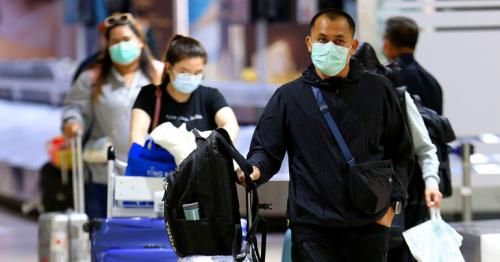Europe infections near 900,000, France extends lockdown
Europe remained the continent in the world hardest hit by the COVID-19 pandemic, as nearly 900,000 people here had contracted the novel coronavirus and nearly 80,000 patients succumbed to the disease, according to a global tally.
Two-faced progress in fighting the virus has led to different readings of results from anti-coronavirus measures among European countries. Hardest-hit countries like Italy, Spain, and France extended their coronavirus lockdowns, while fellow European Union members including Denmark and Austria are easing their restrictions.
Worldwide, the death toll related to COVID-19 was more than 114,000, and the number of confirmed cases neared 1.9 million, according to the U.S.-based Johns Hopkins University, which is tracking the COVID-19 spread in real-time.
More signs of hope
European countries, including those hardest-hit, have seen more signs of encouragement -- slowdown in daily new infections and new deaths, and a flattening virus curve.
In Italy, 566 more COVID-19 patients had died in the past 24 hours, against Sunday's 431, taking the country's toll to 20,465. The number of total confirmed cases -- combining active infections, fatalities and recoveries -- rose to 159,516.
In addition, 3,260 people are in intensive care as of Monday, down by 83. It was the tenth consecutive day that the number of COVID-19 patients in intensive care units showed a decreasing trend, said Italy's Civil Protection Department Chief Angelo Borrelli.
In Spain, fresh figures showed that the number of both new cases and deaths in a 24-hour span dropped. The total deaths rose to 17,489, a daily increase of 517, compared with the 619 deaths in the previous 24-hour span.
This was accompanied by a fall in the number of new cases: 3,477 new cases reported compared to 4,167 on Sunday, bringing the total number of confirmed cases to 169,496 in Spain.
Spanish Health Minister Salvador Illa said that his country has reached the peak of the coronavirus outbreak, adding that it is still "in the lockdown phase" though people in some non-essential sectors are back to work on Monday.
In neighboring France, the day-to-day growth of new cases slowed to 4,188, taking the total infections to 136,779. But Monday also saw the first increase in the daily death toll in four days. Fatalities linked to the virus rose by 574 on Monday, against Sunday's 561, raising the total deaths to 14,967.
Extension of lockdown
French President Emmanuel Macron, in a televised national address on Monday evening, announced that the country will extend its coronavirus lockdown measures until May 11.
"The epidemic is starting to slow down. The results are there," he said. "Hope is reborn but nothing is settled ... The health system is under pressure and the epidemic is not yet under control."
"We must therefore continue our efforts and apply the rules. The more we respect the rules, the more lives we save. This is why the strictest confinement must continue until Monday, May 11," Macron said.
France's current confinement measure, which started on March 17, is due to end on April 15.
Macron said May 11 will mark the start of a new phase in France. From then on, nurseries and schools will re-open gradually, universities will remain closed, along with restaurants, cafes and hotels. All people showing COVID-19 symptoms will be tested.
The Italian government had announced the decision to extend the national coronavirus quarantine, which was first applied on March 10, until at least May 3. But the new rules allow some minor concessions, including the re-opening of stores that sell goods for children as well as those selling stationery and books, beginning April 14.
Spanish Prime Minister Pedro Sanchez said on April 9 that his government would seek to extend the coronavirus "state of alarm" beyond April 25. "I'm telling you now that in 15 days I will have to once again extend the state of alarm," Sanchez said.
In London, British Foreign Secretary Dominic Raab, also First Secretary of State, said the government does not expect to relax or lift the coronavirus lockdown later this week.
"We are still not past the peak," even though there are some "positive signs" from the data that show "we are starting to win this struggle," said Raab. "We don't expect to make any changes to the measures currently in place at that point."
More warnings from WHO
Also on Monday, World Health Organization (WHO) Director-General Tedros Adhanom Ghebreyesus warned that the COVID-19 pandemic accelerates fast but decelerates much more slowly.
"In other words, the way down is much slower than the way up," he told a press briefing, adding that control measures must be lifted slowly and it cannot happen all at once.
"Control measures can only be lifted if the right public health measures are in place, including significant capacity for contact tracing," Tedros said.
He also said WHO will soon publish updated strategic advice to support countries and regions in making decisions on when they can lift the current social and economic restrictions for COVID-19 containment.
"The decisions must be based first and foremost on protecting human health, and guided by what we know about the virus and how it behaves," he said.
According to the WHO chief, the new strategic advice will include six criteria for countries as they consider lifting restrictions, including controlled transmission, enough health system capacities, minimized outbreak risks, and preventive measures, among others.
At a press briefing last Friday, Tedros sounded a similar warning against lifting restrictions too soon.
"Some countries are already planning the transition out of stay-at-home restrictions... Lifting restrictions too quickly could lead to a deadly resurgence," he said then.
tag: international , europe
Share This Post






